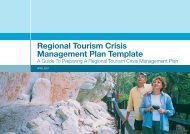Tourism Risk Management - Sustainable Tourism Online
Tourism Risk Management - Sustainable Tourism Online
Tourism Risk Management - Sustainable Tourism Online
Create successful ePaper yourself
Turn your PDF publications into a flip-book with our unique Google optimized e-Paper software.
Recovery Processes<br />
Just as no two crises will ever be the same, so each crisis recovery process will have a life of its own<br />
and will generate different problems requiring a range of knowledge and skills and, above all, the<br />
willingness and ability to adapt to changing circumstances. Once the immediate crisis is over, it’s<br />
necessary to establish what you’re left with: how has it affected regional tourism business, and what<br />
still has to be done to return operations to normal? The crisis management team should provide the<br />
core members of the recovery management team, but it may also need to include representatives of<br />
relevant government departments and agencies, and community leaders.<br />
Recovery decision-making processes will be dependent upon information and an accurate<br />
assessment of the:<br />
• residual effects upon regional tourism operations;<br />
• existing damage to property and infrastructure;<br />
• causes of ongoing disruption to services;<br />
• consequences of the crisis for tourism destinations and surrounding communities; and<br />
• personnel, equipment and measures needed to deal with the recovery operation.<br />
Crisis recovery management tasks include:<br />
• establishing recovery objectives;<br />
• identifying priorities of action;<br />
• identifying current and future needs and identifying sources of assistance;<br />
• communicating with regional tourism operators;<br />
• liaising with relevant government and non-government agencies and community leaders;<br />
• briefing media, government and other agencies on crisis recovery activities;<br />
• monitoring the restoration of business operations;<br />
• tactical and strategic business continuity planning; and<br />
• decision-making.<br />
The destination’s crisis management team should monitor and evaluate community perceptions and<br />
reactions to the crisis to identify and address any community concerns. The public may have<br />
misinterpreted actions taken, or may be angry about perceived inaction by destinations or tourism<br />
operators during the crisis, and any misconceptions need to be addressed as they may have<br />
negative effects upon community support and the return to normal operations.<br />
Debriefing Processes<br />
Debriefings must be conducted following any crisis response or exercise to analyse the management<br />
and outcomes of the crisis and to gain the information necessary to improve plans, procedures and<br />
the training of personnel. Lessons from debriefing processes must be identified and acted upon to<br />
ensure the continual improvement of crisis management capabilities, and these lessons should be<br />
shared with other regional tourism organizations and the industry’s international associations so that<br />
the wider visitor industry can benefit.<br />
64 <strong>Tourism</strong> <strong>Risk</strong> <strong>Management</strong> – An Authoritative Guide to Managing Crises in <strong>Tourism</strong>
















